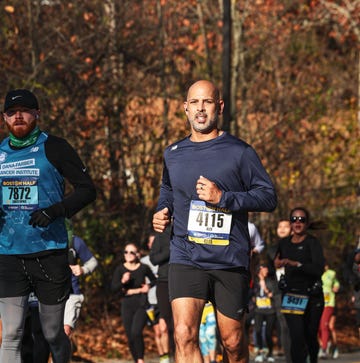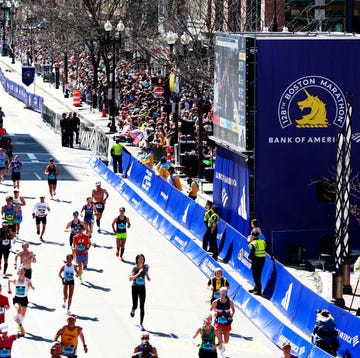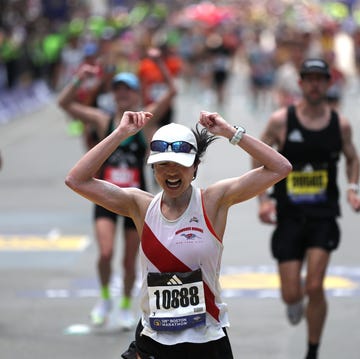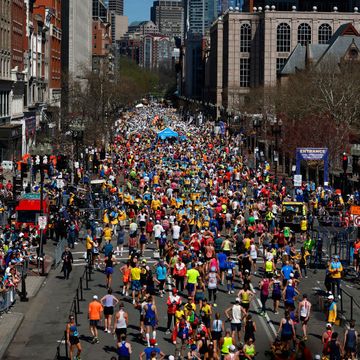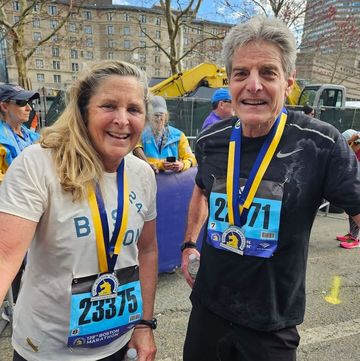Iraqs Ambassador to US Prepares for Boston Boston Marathon. He’s unfamiliar with the quaintness of Hopkinton’s start, for instance, or the madness of Wellesley’s “Scream Tunnel.” And while he is aware of Heartbreak Hill, there’s much still to discover about Boston’s notorious late-race climb. “My running on the treadmill is at an inclination of three,” he says, “which I think is good enough” to get up and over Heartbreak.
Faily will find out for sure on April 21 when he runs his first Boston.
But for all his naïveté about the race, Lukman Faily — Iraq’s ambassador to the United States — will arrive in Boston with an undeniable bond with the marathon, and his 36,000 fellow runners.
Adidas Unveils Boston Marathon Jacket.
The history of the Boston Marathon added a chilling chapter last year when terrorist bombs were exploded at the finish line. The blasts killed three spectators and injured hundreds of others — and left a tragic mark on the legacy of the 118-year-old-race.
Faily knows of such reckless devastation. Born in Baghdad, the 48-year-old diplomat has witnessed the destruction and fear bombs have wrecked on his homeland throughout much of his life. Even now, in the aftermath of the withdrawal of American troops from Iraq, his country continues to struggle for peace. Last month, a terrorist bombing killed 11 of Faily’s ministry colleagues.
But such activity, whether it takes place in Baghdad or Boston, also provides an opportunity for people of different nations to unite and rally, Faily says. That’s why, when he became ambassador to United States last July, “I was determined to participate in the Boston Marathon as a sign of solidarity between the Iraqi people and the U.S. in our fight against terrorism. To make sure everyone understands this is a global problem and we must face this problem [together].”
When the bombs went off on Boylston Street last April 15, Faily was in Tokyo about to complete a three-year assignment as Iraq’s ambassador to Japan. While there, he began running, in part to lose the added pounds that come with eating “fatty, greasy” foods — staples, he says, of many Iraqi diets — and the rigors of a diplomat’s life. He eventually lost 50 pounds. But he also put his running toward a cause. After the 2011 tsunami that killed 20,000 Japanese citizens, Faily committed to running the 2012 Tokyo Marathon and raise money for the victim’s families. He completed his first marathon in 6:15:14; the following year, he finished in 5:54:43.
He also discovered the power of the sport. As a diplomat, he says via telephone from his office in Washington, D.C., “it [is] important to have a long view of things. A marathon teaches you to be tenacious. It makes you aware of belonging to others. You need to have a clear objective. You need to prepare your mind and body. It is more than just the physical element.”
He also says his participation in the sport can serve as sign that Iraq is emerging (with obvious fits and starts) from its tumultuous past. Of course, Faily admits, he still gets awkward responses from fellow Iraqis when he tells them he is training for a marathon. “A partial one?” they’ll ask. No, he tells them, “all 42 kilometers.” And a wave of 26.2s has yet to wash across his country’s shores. (“I know of only one marathon, in the north,” he notes.) Still, while there is no boom to rival the one in the U.S., “running is a sign that we are becoming healthier. We are improving, we are getting back to normalcy, in a sense.”
Faily is bringing such a resolve to his training for Boston, though finding the time isn’t always easy. For starters, he is a father of four young boys who keep him occupied. Plus, his diplomatic work has him jetting back to Baghdad frequently. Much of his build-up for the race, which he will be running for the One Fund Boston charity and for the Education for Peace in Iraq Center, has been done on the treadmill. But this weekend his schedule calls for a 20-kilometer run in Washington’s Rock Creek Park, a favorite space for would-be marathoners. Before his run he’ll fuel with a breakfast of scrambled eggs. He’ll load up his iPod with podcasts from the BBC (“I’m a serious guy in that sense.”). He’ll lace up his Nike treads. And then, for a couple of hours, he’ll clear his head while looking ahead to his race in Boston.
He understands many of his fellow Boston runners may have lingering fears as they prep for the marathon. As someone who has lived through the trials of terrorism, Faily knows a memory like Boylston Street 2013 recedes gradually. “If they don’t [have fear], they have a problem,” Faily puts it bluntly, But he also knows what those runners who will congregate in Hopkinton, and run through the Scream Tunnel, and, if all goes well, beat Heartbreak Hill en route to the finish line will be doing more than running a race. “It is a statement that terror will never win, and that we have this universal language called running or marathoning or sport that we can use to talk to one another with. So I can see the fear, but I can’t see it being sustained. Because terror is not the language we like to talk about; defeating it is the one we have to focus on.”



